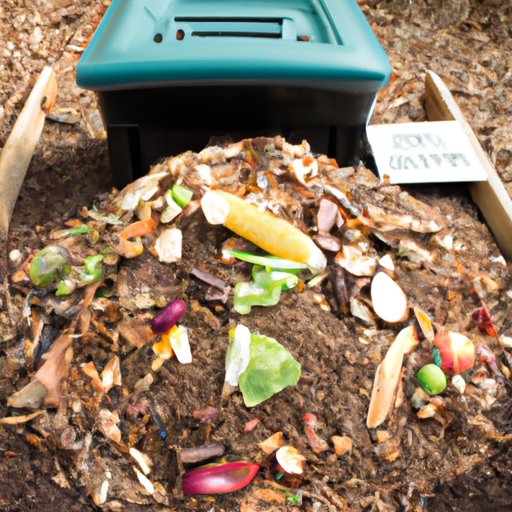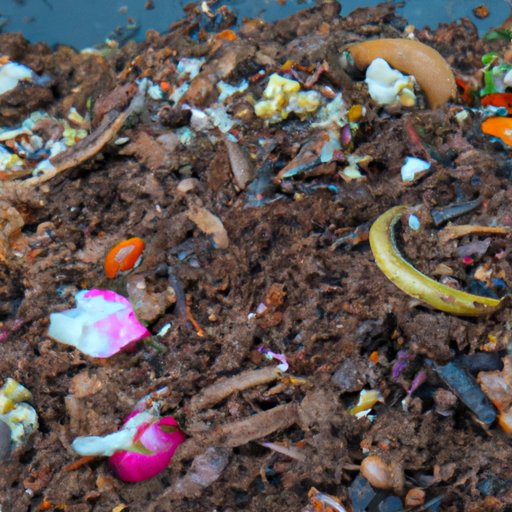Introduction
Composting is an important process that helps to recycle organic material, such as food scraps, yard waste, and paper products, into nutrient-rich soil. It is an essential part of sustainable living and can help reduce our reliance on chemical fertilizers. But how exactly does compost work? In this article, we will explore the basics of composting, including how microorganisms break down organic matter to create compost, what types of materials can be used for composting, how long it takes for compost to develop, and the benefits of composting. We will also provide tips for setting up a compost pile at home.
Composting Basics: An Overview of the Process
Before diving into the specifics of how compost works, let’s first take a look at the basic overview of the composting process. Composting is the process of breaking down organic matter (such as food scraps, yard waste, and paper products) into a nutrient-rich soil amendment known as compost. This process is carried out by microorganisms such as bacteria, fungi, and other organisms. These microorganisms break down the organic matter into simple compounds that can be used by plants as nutrients.
The composting process has three main stages: decomposition, maturation, and curing. During the decomposition stage, microorganisms break down the organic matter into simpler compounds. This process is aided by moisture, oxygen, and other factors. During the maturation stage, the organic matter continues to break down and becomes more stable. Finally, during the curing stage, the compost is exposed to air and sunlight, which helps to further stabilize the material.
There are several different methods for composting, including aerobic composting, vermicomposting, and bokashi composting. Aerobic composting is the most common method and involves using air, water, and heat to break down organic matter. Vermicomposting uses worms to break down organic matter, while bokashi composting uses a special type of inoculated bran to break down organic matter.
How Do Microorganisms Break Down Organic Matter to Create Compost?
Microorganisms are tiny organisms that are too small to be seen with the naked eye. They play an essential role in the composting process, as they break down the organic matter into simpler compounds that can be used by plants as nutrients. This process is known as decomposition, and it involves the breakdown of complex molecules into simpler ones. Microorganisms do this by releasing enzymes that break down the organic matter into smaller molecules.
The type of microorganism used in the composting process depends on the type of organic matter being broken down. For example, fungi are often used to break down woody materials, while bacteria are used to break down green materials such as grass clippings or food scraps. As the microorganisms break down the organic matter, they release nutrients such as nitrogen, phosphorus, and potassium, which can then be used by plants.
What Types of Materials Can Be Used for Composting?
Composting can be done using a variety of materials, including food scraps, yard waste, and paper products. Common materials used for composting include fruit and vegetable scraps, coffee grounds, eggshells, shredded newspaper, and grass clippings. It is important to note that not all materials can be composted, such as meat, bones, and dairy products, as these can attract pests or cause unpleasant odors. It is also important to avoid adding weeds, as these can spread weed seeds throughout your compost pile.
When choosing materials for your compost pile, it is best to use a combination of green materials (such as grass clippings and food scraps) and brown materials (such as leaves and shredded newspaper). Green materials are high in nitrogen, while brown materials are high in carbon. The ideal ratio of these two materials is about 2 parts brown to 1 part green, though this ratio may vary depending on the materials you are using.
How Long Does it Take for Compost to Develop?
The amount of time it takes for compost to develop depends on a variety of factors, such as the size of the compost pile, the type of materials used, and the temperature of the compost pile. Generally, it takes anywhere from a few weeks to several months for compost to fully develop. If the compost pile is kept warm and moist, the process can occur more quickly. On the other hand, if the compost pile is left to dry out, the process will take longer.
What Are the Benefits of Composting?
Composting can have a number of benefits, both for the environment and for your garden. Compost helps to improve soil health by providing essential nutrients and increasing the soil’s ability to retain water. This can lead to healthier plants and higher yields. Compost can also help reduce the amount of waste sent to landfills, as it recycles organic material that would otherwise end up in the trash.
Composting can also help reduce the need for chemical fertilizers, as it provides a natural source of nutrients for plants. Additionally, compost can help prevent soil erosion, as it helps to keep the soil in place. Finally, compost can also help to reduce the amount of greenhouse gases released into the atmosphere, as it helps to break down organic matter more quickly.

Tips for Setting Up a Compost Pile at Home
If you’re interested in starting a compost pile at home, there are a few things you should keep in mind. First, you’ll need to choose a bin or container for your compost pile. This can be anything from a plastic garbage can to a wooden box. You’ll also need to make sure your compost pile is well aerated, as oxygen is needed for the composting process to occur. To do this, you can add small holes in the sides of the bin or turn the compost pile regularly.
You’ll also need to ensure that your compost pile is moist but not soggy, as too much moisture can lead to odor problems. Finally, you’ll want to make sure you turn your compost pile every few weeks to ensure that all of the materials are properly aerated and broken down. With these tips, you’ll be well on your way to creating your own compost pile at home.
Conclusion
Composting is a simple yet effective way to recycle organic materials into nutrient-rich soil. By understanding the basics of how compost works, you can start your own compost pile at home and enjoy the many benefits it has to offer. From improving soil health to reducing the need for chemical fertilizers, composting can help to make your garden more sustainable and your plants healthier.
(Note: Is this article not meeting your expectations? Do you have knowledge or insights to share? Unlock new opportunities and expand your reach by joining our authors team. Click Registration to join us and share your expertise with our readers.)
